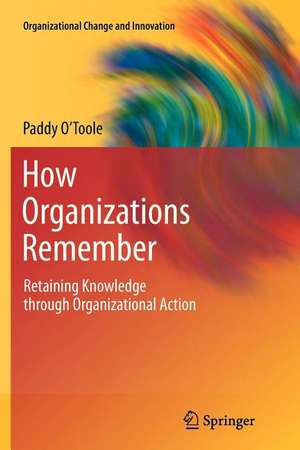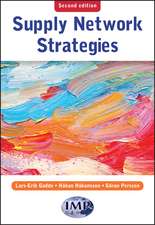How Organizations Remember: Retaining Knowledge through Organizational Action: Organizational Change and Innovation, cartea 2
Autor Paddy O'Tooleen Limba Engleză Paperback – 25 dec 2012
| Toate formatele și edițiile | Preț | Express |
|---|---|---|
| Paperback (1) | 635.80 lei 6-8 săpt. | |
| Springer – 25 dec 2012 | 635.80 lei 6-8 săpt. | |
| Hardback (1) | 642.03 lei 6-8 săpt. | |
| Springer – 5 noi 2010 | 642.03 lei 6-8 săpt. |
Preț: 635.80 lei
Preț vechi: 748.00 lei
-15% Nou
Puncte Express: 954
Preț estimativ în valută:
121.68€ • 126.56$ • 100.45£
121.68€ • 126.56$ • 100.45£
Carte tipărită la comandă
Livrare economică 14-28 aprilie
Preluare comenzi: 021 569.72.76
Specificații
ISBN-13: 9781461427278
ISBN-10: 1461427274
Pagini: 204
Ilustrații: XI, 191 p.
Dimensiuni: 155 x 235 x 11 mm
Greutate: 0.29 kg
Ediția:2011
Editura: Springer
Colecția Springer
Seria Organizational Change and Innovation
Locul publicării:New York, NY, United States
ISBN-10: 1461427274
Pagini: 204
Ilustrații: XI, 191 p.
Dimensiuni: 155 x 235 x 11 mm
Greutate: 0.29 kg
Ediția:2011
Editura: Springer
Colecția Springer
Seria Organizational Change and Innovation
Locul publicării:New York, NY, United States
Public țintă
ResearchCuprins
1 INTRODUCTION.- 2 KNOWING ABOUT KNOWLEDGE.- 3 DEVELOPING KNOWLEDGE RETENTION STRUCTURES.- 4 RETAINING KNOWLEDGE THROUGH COMMUNICATION.- 5 MANAGING KNOWLEDGE RETENTION STRUCTURES.- 6 HOW ORGANIZATIONS RETAIN KNOWLEDGE.- 7 THEORY AND IMPLICATIONS.
Notă biografică
Paddy O'Toole is a Senior Lecturer at Flinders University, South Australia.
Textul de pe ultima copertă
How an organization works is largely a function of what it knows—i.e., the collective knowledge about all aspects of the enterprise, from competitive intelligence to formal systems and policies to the ways in which individuals solve problems and share their expertise. Organizational knowledge is not to be found in manuals and web sites, but in the day-to-day interactions among employees, suppliers, customers, investors, and other stakeholders. How Organizations Remember is based on a 10-month study of a technology firm with locations in three countries (Australia, US, and Ireland); the company has undergone rapid growth and expansion, which have had a profound impact on power structures and organizational culture, and hence, on the ways in which knowledge is created and disseminated. The author discovered that what is remembered is diverse, and of differing value within and across the organization. How knowledge is remembered is equally diverse, and ranges from computer files to cartoons on the wall, from stories to the way objects are placed on a desk. Knowledge is influenced by external influences as well as internal influences; knowledge may become a competitive advantage, but may also contribute to inertia. The book combines theoretical perspectives and empirical findings to generate insights that contribute to both research and practice in organizational learning, innovation, culture, and behavior.
Caracteristici
Focuses on the little-researched phenomenon of organizational knowledge retention, and its implications for enterprise performance Integrates theory and empirical (in-depth case study) research Generates insights to both research and practice in organizational learning, innovation, culture, and behavior. Includes supplementary material: sn.pub/extras











